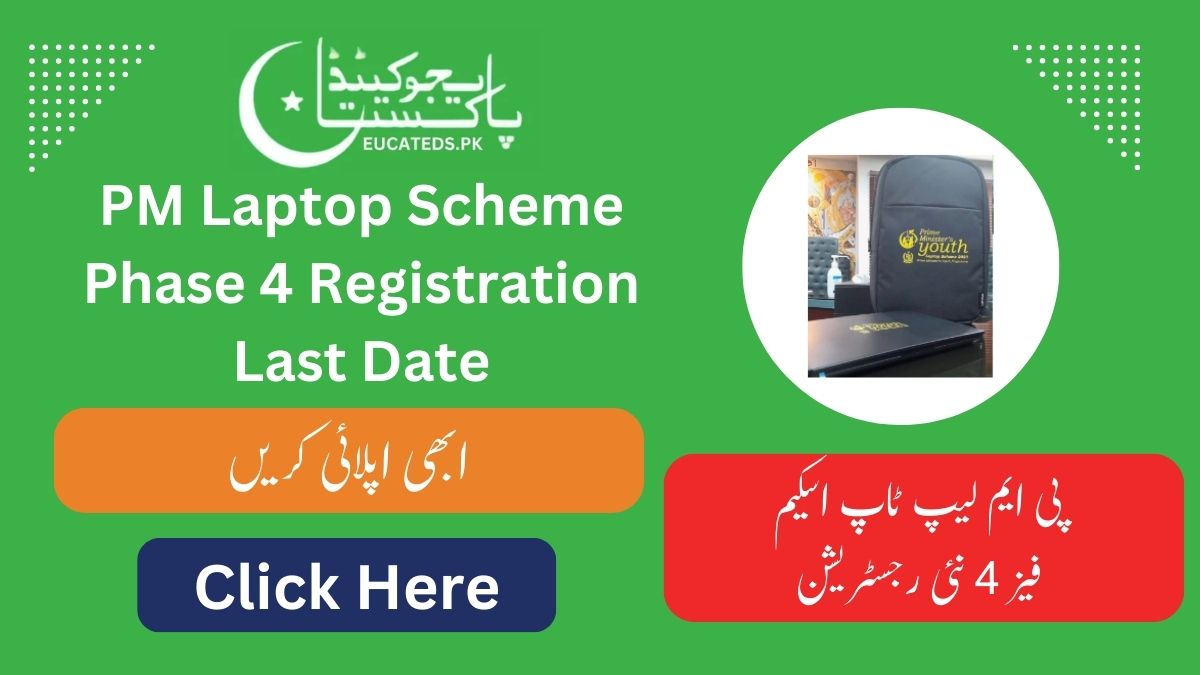PM Laptop Scheme 2024 Phase IV Registration is open. This is good news for the male and female students studying in universities Students who have not received a laptop so far are informed that the Higher Education Commission has permitted them to purchase 1 lakh more laptops. The next phase of the TOP scheme is announced, and the registration process begins.
PM Laptop Scheme 2024 Registration Date Announced
Prime Minister Shahbaz Sharif has introduced a plan to provide free laptops to Pakistan’s students. Thus, as part of the Prime Minister’s Laptop Program 2024, students attending colleges, universities, and technical institutes would receive free laptops.
The Prime Minister Youth Laptop Program 2024 is a new initiative that the Prime Minister has just released. For this reason, HEC will soon begin accepting online applications for the government’s 2024 free laptop program. The PM Laptop Scheme 2024 application status can now be viewed online via the PM Laptop Scheme Portal. Students can apply online through the PM Youth Program portal laptop.pmyp.gov.pk.
PM Laptop Scheme Registration (Phase 4) Process:
- Visit HEC Portal: Head to the Higher Education Commission’s website and navigate to the PM Laptop Scheme section.
- Create Account (New Users Only): Use your CNIC and mailing address to register. Existing users can simply log in.
- Complete Online Form: Accurately fill out the form with your personal, academic, and contact information.
- Upload Documents: Ensure all required documents (university ID, CNIC, academic transcripts) are scanned and uploaded in the specified format.
- Submit & Review: After completing the form and uploading documents, carefully review your application before submitting it.
- Confirmation & Tracking: Upon successful submission, you’ll receive a confirmation email. You can also track your application status through the portal.
پی ایم لیپ ٹاپ اسکیم فیز 4 نئی رجسٹریشن
Students are urged to apply as soon as possible and to make sure all necessary paperwork is to prevent any last-minute problems.
PM’s National Laptop Scheme How to Apply
Interested students are advised to Apply Online by registering or updating their profile at the following link of the Students’ Service Portal. Students can apply through through Mobile App.
Who can Apply (Eligibility Criteria):
- Currently enrolled students in public universities/colleges (as identified by HEC)
Explanation:
- This clarifies that the program is only for students enrolled in public universities and colleges, not public schools.
- It removes unnecessary phrases like “as of now” and “are given awards for.”
Who is Not Eligible:
- Students enrolled in private universities or colleges.
- Students who previously received a laptop through a government Youth Laptop Program (federal or state).
- International students (excluding those from Azad Jammu and Kashmir).
- Students who have already completed their diploma studies.
General Instructions
- Track Application Status: Check your application progress under “Application Status.”
- Find Eligible Universities: View the list of approved universities under the “List of Eligible Universities” tab.
- Contact University Focal Person: Locate your university’s contact person for the PM Laptop Scheme using the “Search Focal Person” tab.
- FAQs: Get answers to common questions by visiting the “FAQs” section.
Important Notes:
- Use your own valid CNIC, mobile number, and email address during registration. This information is crucial for processing your application. Incorrect data may lead to disqualification.
- Technical Issues: If you are facing problems receiving SMS verification during registration, report the issue with your phone number.
Read Also, EPI Sindh STS Vaccinator Slip 2024
The project is to provide young and brilliant students enrolled in public higher education institutions (HEIs) across the nation, including those in Azad Jammu & Kashmir, with chances in the form of computers. The Prime Minister Youth Laptop Scheme (PMYLS) Phase-IV project has been approved by ECNEC. In this sense, a transparent online method would be used to give 100,000 computers to brilliant kids based only on merit. The Higher Education Commission has successfully implemented two of these programs in the past.

